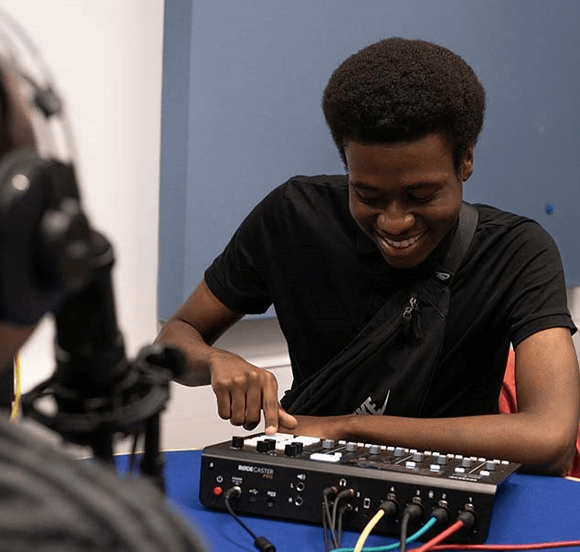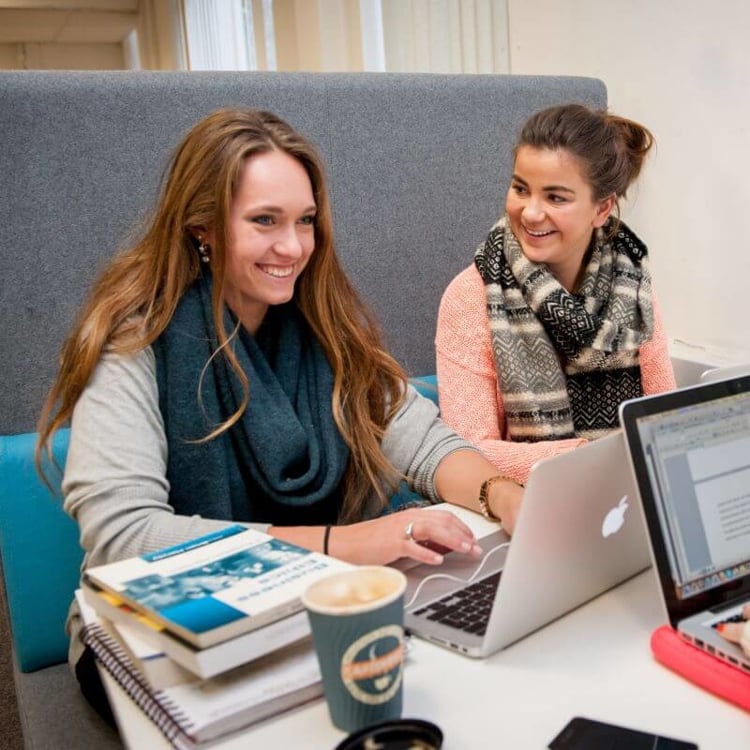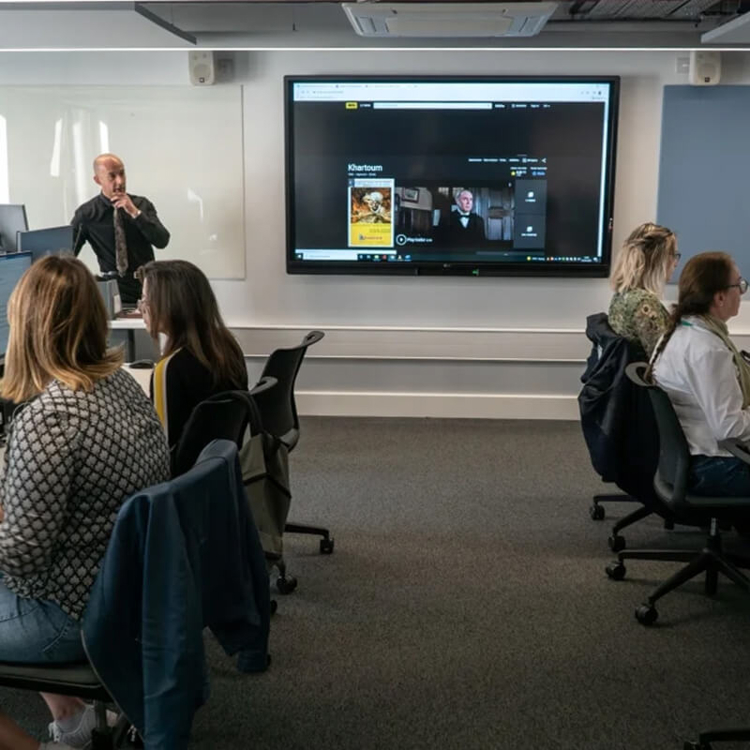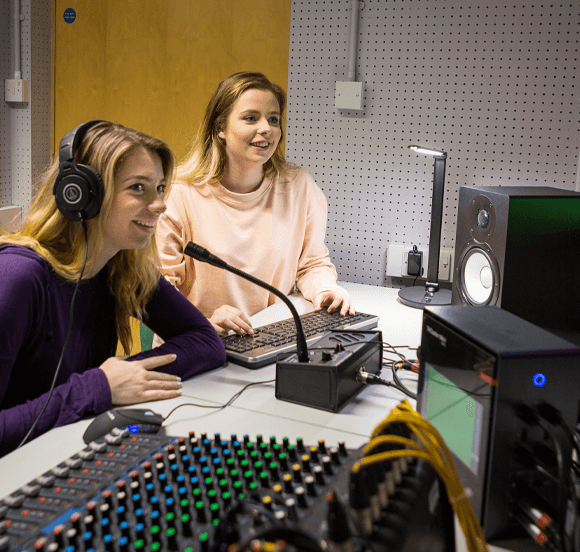/ Undergraduate /
Start date:
September 2025
You'll need:
112 UCAS points (or equivalent)
Foundation Year entry: 64 UCAS points (or equivalent)
UCAS codes:
P300
P301 (if choosing Foundation Year)

On-Campus Taster Day
Wednesday 9 April 2025
Learn to communicate through storytelling, content creation, and branding across platforms. With hands-on projects, industry tools, and real-world experience, you'll build creative and professional skills for careers in media, marketing, and communications - preparing you to shape the stories that inspire and connect diverse audiences.
Did you know?
This Media and Communication Programme is accredited by The Chartered Institute of Marketing (CIM). The accreditation provides students with the opportunity to be part of a worldwide community of members and the opportunity to enhance their employability by taking CIM globally recognised professional qualifications in their initial steps towards Chartered Status.

Top 3 modern university in London
(Complete University Guide 2025)

Ranked in the top 15% in the world
Times Higher Education Young University Rankings 2024

#8 in England for undergraduate student satisfaction
National Student Survey 2024

Foundation Year
This course can also be studied with a foundation year (September entry only).
Modules
This course offers all students the option of a one-year paid work placement, to boost your employability even further. If you choose this route, you will take the placement following year two of your course, and then return to complete your degree.
Why take a placement?
A placement year is the perfect opportunity to gain valuable work experience, to build on the career skills we will teach you on this degree. The connections you make on the placement will improve your career prospects further, and equip you with the skills you need to secure graduate-level employment.
How we support you
The University's Placement and Work Experience Team are experts at helping you to secure a placement. They will work closely with you from the start, helping you research potential employers, discover placement opportunities, create and pitch your CV, and will coach you to perform well in interviews. We aren't able to guarantee a placement, but our sector-leading advisors will give you the best possible chance of securing one.
Find out more about how we'll support you
We understand that your plans might change once you start your programme. If you decide not to do a placement, you will have the option of completing the three year version of your programme.
Whatever your choice, you will have access to many opportunities for work experience through our Placement and Work Experience Team, and access to face-to-face and 24/7 online careers support.
This course offers a foundation year, which takes place at the beginning of your studies. Studying a foundation year will give you academic and practical experience, and a strong introduction to your subject, ensuring you succeed on your undergraduate degree.
30 credits
You will develop your core academic and integrated English language skills of speaking, listening, reading and writing. You will become familiar with key academic skills and concepts, such as referencing methods and awareness of academic integrity and tone. You will apply these skills and knowledge to both broad topics and also your chosen subject pathway.
Teaching and learning
You will be required to actively engage in on-campus learning for up to 10 hours a week.
You will be taught through a full range of teaching and learning methods, which include lectures, seminars, workshops, discussion groups, group directed tasks and presentations. This will enable you to learn from your peers and tutors in both structured and information settings.
You will be encouraged to think creatively about your approach to learning and discussions with your peers. You will also have access to recordings, resources, links and signposting through Moodle to enrich your learning.
Assessment
You will be assessed through group and individual presentations, comparative and reflective essays, multiple choice exams, coursework and reports, oral exams, portfolios, case studies and blogs.
30 credits
You will develop your research, numeracy and information technology skills. You will investigate the difference between primary and secondary research, conduct your own research project and demonstrate your findings through data analysis. You will also develop your awareness of equality, diversion and inclusion in the UK, through a real-world issue; discrimination in the workplace.
Teaching and learning
You will be required to actively engage in on-campus learning for up to 10 hours a week.
You will be taught through a full range of teaching and learning methods, which include lectures, seminars, workshops, discussion groups, group directed tasks and presentations. This will enable you to learn from your peers and tutors in both structured and information settings.
You will be encouraged to think creatively about your approach to learning and discussions with your peers. You will also have access to recordings, resources, links and signposting through Moodle to enrich your learning.
Assessment
You will be assessed through group and individual presentations, comparative and reflective essays, multiple choice exams, coursework and reports, oral exams, portfolios, case studies and blogs.
30 credits.
This module invites you to take on the role of a video content creator, building on the skills acquired in Fundamentals of Image Making. You will examine the dynamic world of social media as news, with a particular focus on the theme of "identity." You will explore the impact of distributed media, examining how non-professionals contribute to shaping new media practices through platforms like YouTube, TikTok and Instagram.
Throughout the module, you will critically engage with the history and implications of self-promotion on social media, analysing its influence on society and the efforts to address its challenges. You will also explore citizen journalism, where social media content plays a pivotal role in reporting on crises and events inaccessible to traditional news outlets.
Teaching and learning
In weekly seminars, you will explore citizen journalist strategies – from video blogging to video editing – for creating engaging media content. Alongside these hands-on activities, you will engage deeply with thought-provoking questions about identity, voice, and representation in the digital age.
By the end of the module, you will have the skills to create compelling video content and a nuanced understanding of the role of social media in shaping our world.
The teaching delivery for each module consists of one, one-three-hour lecture and one, two-hour workshop per week. Lectures will provide a critical foundation, introducing key concepts such as identity, social media and citizen journalism, while seminars will focus on hands-on skill development.
There will be an additional 30 minutes of online digital support per week. This will consist of virtual learning tools to extend access to resources through online tutorials, videos, and discussion forums.
Due to the highly technical nature of this module, you will be taught in a computer lab equipped with Adobe Creative Suite to support the required software-based learning outcomes.
You will also have access to DSLR cameras, microphones, lighting equipment, and a dedicated photography/filming studio, to facilitate practical exercises in media production.
Assessment
This module will be assessed using critical commentary and a self-produced video.
30% - critical commentary, you will explore the module theme ‘identity’. You will critically analyse a piece of video content that engages with the concept of identity.
70% - self-produced video, you will produce a four-minute video as a piece of citizen bases, engaging with the module theme of ‘identity’.
30 credits
In this module, you will critically explore how media representations are constructed and manipulated. You will examine semiotics, framing, and context, understanding how these elements influence perception.
The module will also address the social and cultural impacts of altered imagery, focusing on the concept of authenticity and the ethical considerations of image manipulation, while reflecting on historical perspectives of visual content authenticity.
You will gain practical skills in photography, learning to control key technical aspects like aperture, shutter speed, ISO, and colour temperature. You will also explore the use of natural and artificial lighting to create specific moods, alongside composition techniques such as focal length and depth of field to enhance your imagery.
The module also introduces you to Adobe Photoshop, starting with basic tools and non-destructive editing techniques. You will advance to more complex methods like masking and compositing, developing a cohesive photographic project. Finally, you will manage workflows and deadlines, preparing your work for an online portfolio to showcase your skills as both a photographer and an image-maker.
Teaching and learning
The teaching delivery for each module consists of one, one-three-hour lecture and one, two-hour workshop per week. Lectures will provide a critical foundation, introducing key concepts such as media practices, and image construction, whilst seminars will focus on hands-on skill development.
There will be an additional 30 minutes of online support per week. This will consist of virtual learning tools to extend access to resources through online tutorials, videos, and discussion forums.
Due to the highly technical nature of this module, you will be taught in a computer lab equipped with Adobe Creative Suite to support the required software-based learning outcomes.
You will also have access to DSLR cameras, microphones, lighting equipment, and a dedicated photography/filming studio, to facilitate practical exercises in media production.
Assessment
This module will be assessed using a research presentation and a creative online portfolio.
30% - research presentation, you will deliver a 5-minute in class exploring the module of theme of ‘authenticity’. This will involve selecting a visual event from a media-related field and critically analysing how the chosen image(s) engage with the concept of authenticity.
70% - creative online portfolio, you will produce a photographic series that creatively interrogates the notion of ‘authenticity of the image’.
These modules are those we currently offer and may be subject to change.

Skills
Skills that help you grow.
This professionally oriented degree equips you with creative and critical thinking, executive skills, and business awareness crucial for success in the creative industries. Learn key media functions that shape consumer culture, preparing you to excel and innovate in your career, including:
- Marketing
- Branding
- PR
- Advertising
- Data
- Audience engagement
In addition, you will develop journalistic skills such as conducting research, identifying and interviewing credible sources, editing texts, and selecting stories for publication. You will also gain general knowledge about the business of media, familiarising you with the professional media environment already before you graduate.
Learning
Experience dynamic learning through specialised lectures, interactive seminars, practical workshops, and stimulating field trips.
Taught by academics and industry professionals, our programme immerses you in real-world media and communications, igniting your creativity and professional growth. You will engage in hands-on projects covering:
- Digital media production
- Project management
- Radio and podcasting
- Photography
- Feature writing
- Marketing and digital communications strategies
- Storytelling and media language
You will also have the opportunity to conduct research on key topics relating to media communications and will be encouraged to reflect on your own role as a consumer and creator of media content.

Assessment
Your assessments will mirror the Media and Communications industry, including individual and team projects.
This will ensure you’re fully prepared for life after graduation. Your assessments will include:
- Creative Media Projects
- PR Campaigns
- Case Study Projects
- Reflective Essays
- Presentations
- Portfolio Work
These hands-on assignments will equip you with the skills and experience needed for a successful career in media and communications.
Career
Launch your Media and Communications career!
Explore a variety of career paths in PR, digital marketing, and content creation, while gaining hands-on experience with industry-standard tools. Join us to craft compelling stories, innovate with technology, and lead in the future of media.
Our graduates go on to work in roles such as:
- Digital editor and writer
- Digital communication manager
- Web designer
- Digital campaign manager
- Social media content manager
- Online PR manager
- Customer experience manager
- Online advertiser
- Digital assets curator
- Interactive media designer
- Digital project manager

Open days
Get a real taste of our campus, community and what it’s like to study at Roehampton
Applying
Full-time UK undergraduate students apply through UCAS.
Course subject to curriculum review and validation.
Entry tariff
112–128 UCAS points (or equivalent)
Foundation Year: 64–80 UCAS points (or equivalent)
Looking to work out your UCAS points or find out about our entry requirements? Find out more.
When we consider applications to study with us, we form a complete view of your achievements to date, and future potential, and can offer flexibility in entry requirements. Find out more about our Contextual Offer scheme.
We welcome applicants with a wide range of qualifications, including BTECs, A-levels and T Levels.
General entry requirements
September 2025 entry tuition fees
UK (home) tuition fees
Undergraduate degree: £9,535
Foundation Year: £5,760
We offer a wide range of scholarships and bursaries. See our financial support pages for UK students.
We also provide other ways to support the cost of living, including free buses and on-campus car parking, hardship support and some of the most affordable student accommodation and catering in London. Find out more about how we can support you.
International undergraduate students apply through our direct application system.
Course subject to curriculum review and validation.
Entry tariff
112–128 UCAS points (or equivalent)
Foundation Year: 64–80 UCAS points (or equivalent)
Looking to work out your UCAS points or find out about our entry requirements? Find out more.
When we consider applications to study with us, we form a complete view of your achievements to date, and future potential, and can offer flexibility in entry requirements. Find out more about our Contextual Offer scheme.
General entry requirements
September 2025 entry tuition fees
EU and international tuition fees
Undergraduate degree: £16,950
Foundation Year: £16,950
International Foundation Pathway: £16,950
We offer a wide range of scholarships and bursaries. See our financial support pages for international students.
We also provide other ways to support the cost of living, including free buses and on-campus car parking, hardship support and some of the most affordable student accommodation and catering in London. Find out more about how we can support you.






